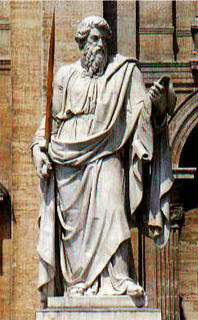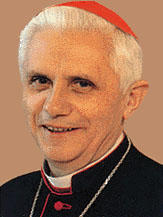 (Twenty-ninth Sunday of the Year (C): This homily was given on October 18, 2004 at St. Pius X Church, Westerly, R.I. Read 2 Timothy 3:14-4:2.)
(Twenty-ninth Sunday of the Year (C): This homily was given on October 18, 2004 at St. Pius X Church, Westerly, R.I. Read 2 Timothy 3:14-4:2.)[For the audio version of this homily, click here: Twenty-ninth Sunday 2004]
I had two interesting experiences recently involving the Bible. One was my exchange in the Westerly Sun with Mr. David Madden, who was trying to convince me (and the rest of our community) that the Bible does not condemn homosexual activity. Well, leaving aside Romans 1, Mark 7, and the story of the destruction of Sodom and Gomorrah, there’s Leviticus 18:22 which says, “You shall not lie with a male as with a woman; such a thing is an abomination.”
I wonder what part of the word “abomination” Mr. Madden doesn’t understand.
The second experience took the form of a conversation I had in the rectory living room about a week ago with an angry parishioner, who lambasted me for talking about abortion and other social issues in my homilies.
She said, “When I come to church, I want to hear about the Bible, not those other things.”
All of this raises a very interesting question: What exactly is the Bible?
Is it a book that we can interpret as we see fit? Is it a book that can be interpreted in contradictory ways?—which is what Mr. Madden seems to believe.
Is it a book of fairy tales that we read in church once a week so that we can feel good about ourselves and escape from the harsh realities of daily life?
Well thankfully today, in our second reading from 2 Timothy 3, these important issues about the Bible are addressed. Timothy, of course, was a frequent companion of the apostle Paul and a presbyter (a priest) in the early Church.
Paul begins this passage by saying to his young friend, “Remain faithful to what you have learned and believed, because you know from whom you learned it.” The implication here is that Timothy was bound by something objective—something objective which he had been taught. Thus he was not free to decide for himself what was true and false, right and wrong, good and evil (which is precisely what Mr. Madden and many other people today believe). According to Paul, Timothy had to be faithful to a body of revealed, objective truth—a body of truth which had been taught to him by his good teachers. Those teachers, incidentally, would certainly have included his mother, Eunice, and his grandmother, Lois, who are both mentioned by name in the first chapter of this letter.
Then Paul commends Timothy for knowing the Scriptures (in this context “Scriptures” refers to the Old Testament, because there wasn’t any New Testament yet!).
In our day and age, of course, many claim to “know” the Bible. But the interesting thing is they often disagree! As Mr. Madden pointed out in one of his letters in the Sun, there are divergent and even contradictory opinions today concerning what the Bible teaches on homosexuality and just about every other subject.
So how do we know if a particular Biblical interpretation is legitimate or erroneous? How do we know if it’s in accord with the “objective truth” that Paul told Timothy he must be faithful to?
Mr. Madden asked me a similar question in the Sun when he said, “What determines when we will be bound by the authority of Scripture and when we will not?”
For those who missed my response, I’ll give it again here, because it merits repeating in this context:
“True Christians would—and should—answer that we are always bound by the authority of Scripture. But, to be fair, Madden’s question does point to the deeper and more troublesome issue of proper biblical interpretation. How do we know what a given passage of Scripture really means? He mentions the divergent opinions among Christians concerning various verses of Mark 7 and 10. As we all know, such opposing views are common regarding these and many other key biblical texts.
Catholics respond to this problem by saying that this is precisely why Jesus Christ established an authoritative Church on the Rock of St. Peter (see Matthew 16!). Knowing the proclivity of human beings to twist and pervert God’s timeless truth, Christ set up an authoritative Church to faithfully interpret his authoritative Scriptures.
Without the Church to guide us in understanding God’s holy word, biblical interpretation becomes nothing more than ‘your opinion versus my opinion.’”
So the teaching of the Church is the key: it’s the key that unlocks the door to the REAL truth of Christ!
In this passage from 2 Timothy Paul then says, “All Scripture is inspired by God and is useful for . . . “(here he lists several things, all of which relate to my conversation in the rectory living room the other day with that angry parishioner).
Paul first says that all Scripture is useful for “teaching.”
For teaching what?
For teaching the truth (the objective truth he referred to a few lines earlier): the truth about who God is; the truth about the meaning of life; the truth about Jesus Christ and salvation; the truth about the dignity of the human person and the truth about God’s commandments. And, lest we forget, one of those commandments is, “Thou shalt not kill”—which has a direct connection to abortion and to several other sins.
He goes on to say that all Scripture is useful for “refutation.”
For the refutation of what?
For the refutation of lies and errors about God, and salvation, and the human person, and the commandments, and a host of other things, including abortion! (The reason I keep mentioning abortion here is because our parishioner didn’t seem to see any connection between this sin and the Bible. But—as I trust I’m making clear—there IS a connection!)
Paul then says that all Scripture is useful for “correction.”
For the correction of whom?
For the correction of those who are in sin and error—and especially of those who stubbornly persist in their sin and error (which certainly includes those who publicly support crimes against innocent human life, either at its beginning or at its end!).
And finally Paul says that all Scripture is useful for “training in righteousness, so that one who belongs to God may be competent, equipped for every good work.”
And that’s the bottom line. If we allow God’s objective truth in the Bible—as taught by the Church—to form us and correct us and keep us from error and sin, we will be holy! We will be faithful disciples of Jesus Christ here on earth—and we will be on our way to heaven, whenever the Lord calls us home.
This is why I will continue to do what St. Paul tells Timothy, the priest, to do at the end of this text. He says, “Proclaim the word; be persistent whether it is convenient or inconvenient; convince, reprimand, encourage through all patience and teaching.”
That’s the vocation of a priest. It’s been that way since the time of Timothy. By the way, he is now in heaven; he is enjoying eternal life with Jesus Christ—and (no doubt) with many of the people to whom he preached during his life.
And that’s where I want to be someday, along with everyone who hears me proclaim God’s word from a pulpit! Which is precisely why I will continue to preach the way I’ve always preached!

